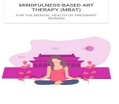The effectivity of mindfulness-based art therapy application-based artificial intelligence on the mental health of pregnant women

Downloads
Additional Files
Background: The COVID-19 pandemic has become a new stressor with significant pregnancy consequences, limiting access to health services. Mindfulness-Based Art Therapy (MBAT) has been proven to intervene in the body-mind-soul and improve mental health problems. However, no research has developed it into a form of artificial intelligence for use by pregnant women in supporting the current situation of access to health services.
Purpose: This study aims to produce a system of MBAT based on artificial intelligence for early detection and to prove the effectiveness of improving mental health in pregnant women.
Methods: This study employed Research & Development consisting of 4 stages, namely Literature Study, Development Stage, Validity Expert, and Trial.
Results: The MBAT application has five features, from mental health information to history. The validity score of the application system is 87.33%. The trial results showed that the application effectively reduces stress levels by 91.26% and anxiety by 90.24%. Also, the application can predict the percentage reduction in stress and anxiety levels correctly and without errors using the decision tree.
Conclusion: This application is helpful for pregnant women and health workers in detecting stress and anxiety levels early in pregnancy and improving mental health.Authors retain copyright and grant the journal right of first publication with the work simultaneously licensed under a Creative Commons Attribution-NonCommercial 4.0 International License that allows others to share the work with an acknowledgement of the work's authorship and initial publication in this journal.
Authors are able to enter into separate, additional contractual arrangements for the non-exclusive distribution of the journal's published version of the work (e.g., post it to an institutional repository or publish it in a book), with an acknowledgement of its initial publication in this journal.
Authors are permitted and encouraged to post their work online (e.g., in institutional repositories or on their website) prior to and during the submission process, as it can lead to productive exchanges, as well as earlier and greater citation of published work (See The Effect of Open Access).

This work is licensed under a Creative Commons Attribution-NonCommercial 4.0 International License.











